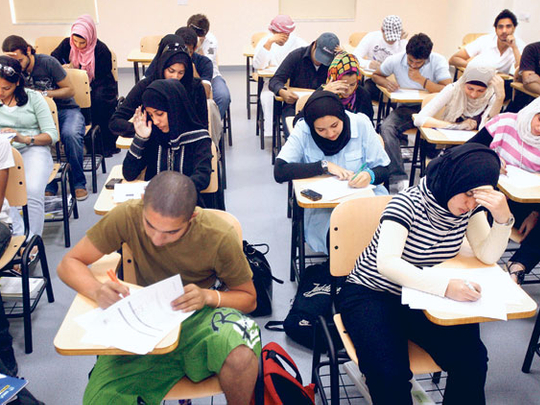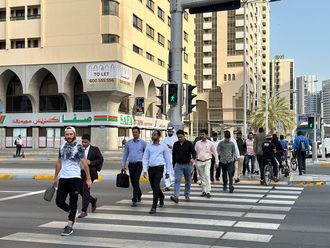
Around 90 per cent of public and private secondary school graduates in the UAE who apply to federal universities are not qualified to immediately engage in undergraduate level studies.
Dr Marshall Drummond, Provost of the Higher Colleges of Technology (HCT), revealed this figure based on HCT admissions and said the case was similar for the other two federal universities in the country — Zayed University and UAE University.
"We are faced with a challenge when only 10 per cent of students are ready to immediately engage in post secondary studies," said Drummond. "We can either tell the remaining 90 per cent of the students to go away or choose to help them improve their current abilities," he added.
This is a reality not only at federal universities as private institutions have also reported increased intakes on their foundation programmes. Meanwhile others have recently introduced remedial programmes to cater to an increasing demand.
Increase in IFP intake
Racquel Warner, the International Foundations Programme (IFP) Coordinator at Middlesex University in Dubai (MUD), reported a 30 per cent increase on this year's IFP intake compared to figures from September 2009. "This has always been the trend in our five years of existence — our IFP figures have always been on the increase, never on the decline," she said.
Foundation programmes, also known as pre-university programmes or remedial courses, are designed to equip students with supplementary skill sets and education in order to successfully enter undergraduate degree programmes.
Yet the question remains why such a disproportionate number of secondary school graduates are ill-prepared for tertiary education; or why admissions to these programmes are on the rise.
"The Ministry of Higher Education and Scientific Research does not allow students with a secondary school average of below 60 per cent to be admitted to any undergraduate degree programme," said Dr Muthanna Abdul Razzaq, President of the American University in the Emirates (AUE).
Abdul Razzaq said a student with a weak score is not necessarily a bad student, but may have faced difficult circumstances during their final exams and simply did not perform well. "So why shouldn't we give them a final chance to try and succeed through foundation programmes?" he asked.
AUE has a 75 per cent Emirati population of a total student body of 1,200 and successfully admitted 45 students to its foundation programme since its approval by the ministry two years ago.
Similarly, Al Ghurair University Dubai (AGU) introduced its foundation programme with the start of the new academic year as a bridge for under- qualified students to access higher education.
"The idea [behind the introduction of the foundation programme] was to increase the level of accessibility of university level education for more students," said Dr Lawrence Loh, Vice-President of AGU. "This way more students, in particular Emiratis, can enter university and not miss the opportunity to get a bachelor's degree." He added that 75 per cent of AGU's population of its present 1,500 student body consists of Emiratis.
Drummond said that although national statistics have yet to be gathered, of the 8,124 school graduates admitted to the HCTs across the country, only 790 achieved minimum requirement test scores on the Common English Placement Assessment (CEPA), used to admit students to bachelor degree programmes at federal universities.
Yet, Warner believes the increasing numbers of foundation programmes and students admitted to them in universities across the country may be due to diverse schooling systems.
"These students come from schools where teachers coach them and are then put into an environment where they have to analyse data on their own," she said. "We can't expect students to learn content and regurgitate it at the school level, then suddenly possess analytical skills at the university level."
A helping hand
Warner reported that of the 700 new students admitted to MUD, 140 of them we placed in the IFP, while almost 15 per cent of the Rochester Institute of Dubai's (RIT) first undergraduate intake of 80 students this year were placed in its pre-university programme.
"There was a clear need for these students to be admitted onto the programme as they displayed either a deficiency in English or Maths," said Dr Mustafa Abushagur, President of RIT.
He added that in some cases the need arose from students who learnt maths in Arabic and now needed to learn the equivalent in English.
"We clearly found that students' maths skills here [in the UAE] were not as strong as we'd expected," said Abushagur.
The solution
Abushagur believes that secondary school curricula across the country need to improve.
"Clearly I am not an expert, but I know what I see from the students," he said.
Drummond echoes Abushagur's comment: "I'm the guy receiving the product of secondary schools, but my area is colleges and our concern is that students come to us with a good chance of success."
Drummond said that if the situation was reversed and 90 per cent of school graduates were properly equipped to immediately engage in undergraduate level studies, it would cost the country and private institutions less money.
"Currently it takes the average under-prepared student five to six years to achieve the desired educational outcome," said Drummond.
"If it came true that it took all students on average four years to achieve the same results, we could move people out of the system quicker and it would cost the country less money."












